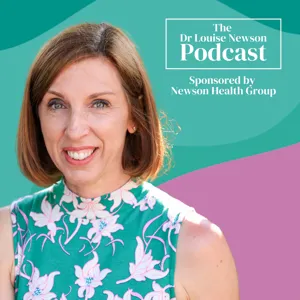Podcast Summary
Improve health during colder months with telehealth, gifts, and cold water dips: Telehealth services offer weight loss meds, Blue Nile gifts show love, cold water dips invigorate and boost metabolism
There are various ways to improve your health and well-being, even during the colder months. For those struggling with weight loss, PlushCare offers telehealth services with doctors who can prescribe FDA-approved weight loss medications. This Mother's Day, consider gifting a beautiful piece from Blue Nile as a token of love and appreciation. As for physical activities, taking a dip in cold water, such as a pool or the sea, can have numerous benefits. While it may seem daunting, starting in late summer or early fall when temperatures are still relatively warm can help make the transition easier. Many people find the experience invigorating and worth the initial shock. Additionally, there are numerous podcasts, metabolism-boosting moves, and supplements that can contribute to overall health and wellness.
Experience the benefits of cold water therapy: Cold water therapy can boost endorphins, ease menopausal symptoms and chronic migraines, and provide a sense of achievement. Accessible options include cold showers and cryotherapy sessions.
Cold water therapy, whether through swimming in cold bodies of water or using cryotherapy chambers, can provide numerous benefits such as an endorphin rush, potential relief from menopausal symptoms and chronic migraines, and a sense of solidarity and achievement. It doesn't have to involve braving the elements in their rawest form, as there are accessible options like cold showers or cryotherapy sessions. The practice has gained popularity due to its potential health benefits and the sense of camaraderie among those who partake in it. Wim Hof, also known as the Iceman, is a leading figure in the field and offers resources for those interested in exploring cold water therapy further.
Cryotherapy vs Cold Water Swimming: Unique Benefits: Cryotherapy energizes and pumps up, cold water swimming brings calm and stillness. Tech leaders use cryotherapy, Mint Mobile offers discounts, Quince provides affordable luxury, 1-800-Flowers offers Mother's Day savings, and coenzyme Q10 is suggested for migraine relief
Both cryotherapy and cold water swimming can provide unique benefits. The former, used by tech industry leaders, leaves one feeling energized and pumped up, while the latter brings about a sense of calm and stillness. On a different note, Mint Mobile is offering discounted wireless plans, Quince provides luxury fashion at affordable prices, and 1-800-Flowers offers Mother's Day savings on gifts and flowers. For those dealing with migraines, coenzyme Q10 is one supplement suggested by the National Migraine Center for its energy-boosting properties.
Effective prevention of migraines with aura or visual disturbances requires higher dosage of magnesium supplementation: For migraine prevention, take a higher dosage of magnesium supplements, around 600mg daily, for 3-6 months.
For effective prevention of migraines, especially those with aura or visual disturbances, a higher dosage of magnesium supplementation is required, around 600 milligrams daily, for a minimum of 3 to 6 months. This information is crucial for those suffering from migraines, as many healthcare professionals may not be well-informed about the proper usage and dosage of magnesium for migraine prevention. Additionally, resources like the National Migraine Center offer valuable treatment and support for those dealing with migraines, with their Heads Up podcast being an excellent source of information. During a recent speaking engagement, it was alarming to discover the lack of knowledge among some top healthcare professionals regarding hormone health and safe HRT usage. Women often find themselves educating medical experts on these matters, and platforms like podcasts can help disseminate important information more widely and challenge outdated beliefs. At a recent dinner with leading experts, discussions centered around the use of hormone replacement therapy for mental health and depression, highlighting the importance of addressing the intersection of hormonal imbalances and mental health concerns.
Boosting metabolism during menopause: During menopause, decreased estrogen levels can lead to mental health issues. Boost metabolism through high-intensity interval training and learn about menopause from resources like the 'Wellness with Lazar' podcast and Whole Foods Market.
As estrogen levels decrease during menopause, mental health issues can arise. These issues can be extensive and interconnected, making it feel like unraveling a ball of yarn. However, there are ways to boost metabolism, such as high-intensity interval training, which can help burn fat faster and provide a metabolism boost. Additionally, there are various resources available for learning about menopause and related health issues, such as the "Wellness with Lazar" podcast. Remember, taking care of your health is important, and small steps like regular exercise and self-education can make a big difference. For more information and inspiration, check out the "Wellness with Lazar" podcast and Whole Foods Market for Mother's Day shopping.
Affordable jet-setting essentials with ethical manufacturing: Quinn's offers stylish, affordable travel essentials at up to 80% less than similar brands, with a commitment to ethical labor standards.
Quinn's offers high-quality, jet-setting essentials at affordable prices. From European linen to premium luggage and buttery soft Italian leather bags, Quinn's has it all. And the best part? These items are priced at 50 to 80% less than similar brands. Moreover, Quinn's commitment to ethical manufacturing practices adds an extra layer of value. The company only works with factories that adhere to safe and ethical labor standards. So, whether you're packing for an upcoming vacation or stocking up for future travels, Quince is the place to go for stylish, affordable, and ethically-sourced essentials. And with free shipping and 365-day returns, there's no risk in trying it out. Head to quints.com/pack to start shopping today.





